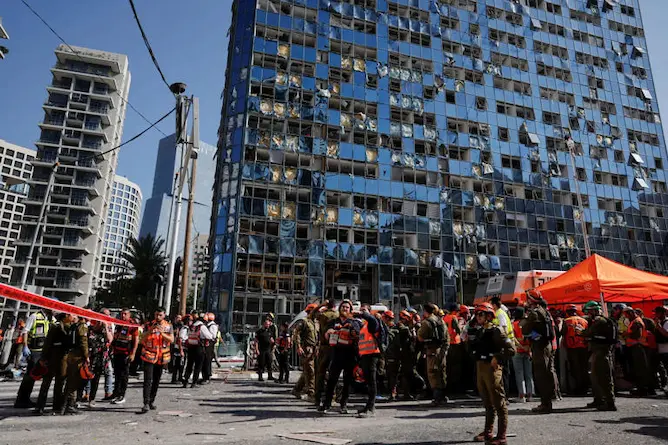
Iran targeted the Tel Aviv Stock Exchange with ballistic missiles, causing extensive damage and sparking fears of financial instability
A Strike on the Nerve Center: Tel Aviv Stock Exchange – Financial District Hit
In the early hours of June 19, Iran launched a fresh wave of missile attacks on Israel, with one of the most symbolic and strategic targets being the Tel Aviv Stock Exchange (TASE). The building, located in the heart of Israel’s financial district, sustained extensive damage as ballistic missiles rained down on central Tel Aviv.
Eyewitnesses described scenes of chaos as sirens blared and explosions rocked the city. “We saw fire erupt from the top floors,” said a local resident. “It was like watching the economy itself go up in flames.”
The strike was part of Iran’s Operation True Promise 3, a retaliatory campaign following Israel’s earlier attacks on Iranian nuclear and military sites. According to Iranian state media, the TASE was chosen as a “symbolic target” to send a message about the vulnerability of Israel’s economic core.
Emergency services rushed to the scene, and at least 32 people were reported injured across multiple strike zones, including Tel Aviv and Be’er Sheva. The full extent of the damage to the stock exchange’s infrastructure and data systems remains under investigation.
Economic Warfare: A New Dimension of Conflict
The targeting of the Tel Aviv Stock Exchange marks a chilling evolution in the Iran-Israel conflict, from military and nuclear sites to economic infrastructure. Analysts warn that this could signal the beginning of a broader campaign of economic warfare, with devastating consequences for regional and global markets.
“This isn’t just about missiles anymore,” said Dr. Yael Ben-David, a geopolitical analyst at the Herzliya Institute. “It’s about destabilizing the financial heartbeat of a nation. Iran is sending a message: no sector is off-limits.”
The Israeli shekel dipped sharply in early trading, and global markets reacted with caution. Oil prices surged amid fears of prolonged instability in the Middle East. The Tel Aviv Stock Exchange, though temporarily shuttered, has vowed to resume operations through backup systems and remote trading platforms.
Prime Minister Benjamin Netanyahu condemned the attack, calling it “an act of economic terrorism.” He vowed a “decisive and overwhelming response,” while urging citizens to remain resilient. “They may strike our buildings, but they will never break our spirit,” he declared in a televised address.
Global Repercussions and the Road Ahead
The international community has responded with alarm. The United Nations Security Council has called for an emergency session, while the United States and European Union condemned the attack as a violation of international norms. “Targeting civilian economic infrastructure is a dangerous escalation,” said U.S. Secretary of State Antony Blinken.
Meanwhile, Iran has defended its actions as a “measured response” to Israeli aggression, particularly the recent bombing of Iran’s Arak heavy water reactor. Tehran maintains that its strikes are aimed at “strategic deterrence,” not civilian casualties.
As the conflict enters its second week, the risk of a broader regional war looms large. With both nations striking symbolic and strategic targets, the line between military and civilian domains continues to blur.
Yet amid the destruction, stories of resilience emerge. Financial analysts, IT teams, and emergency responders are working around the clock to restore operations and protect critical data. “We’re not just rebuilding a building,” said TASE spokesperson Lior Shaked. “We’re defending the future of Israel’s economy.”
Stay updated with the latest news on Rapido Updates. Keep yourself updated with The World, India News, Entertainment, Market, Gadgets, Sports, and many more..